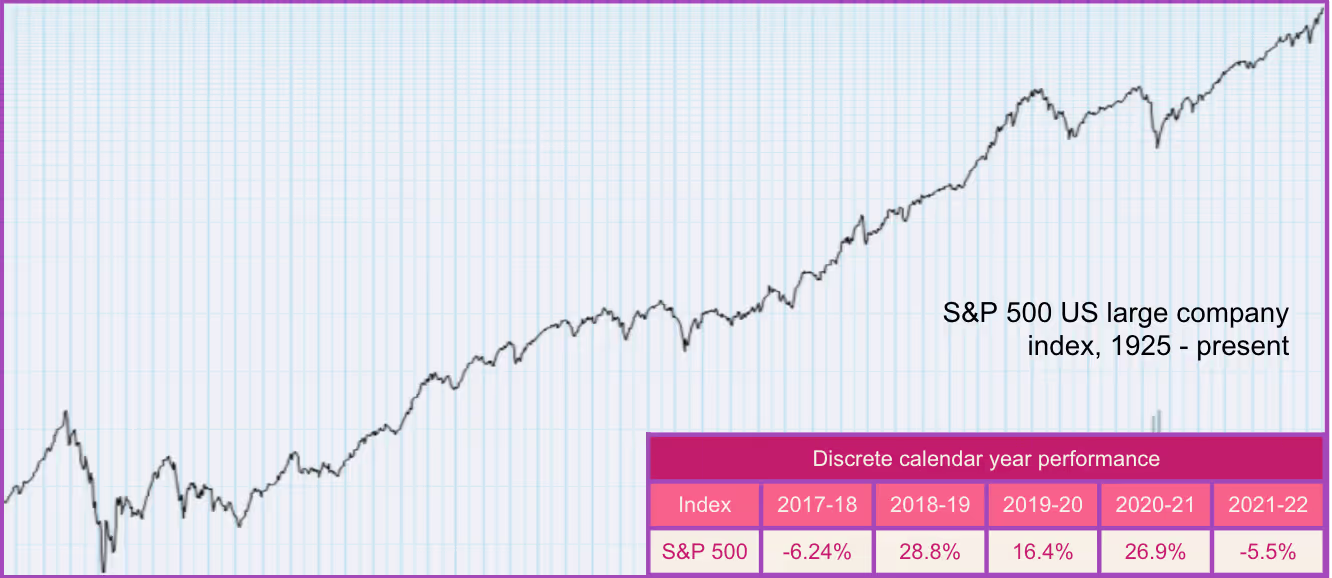Let's cut to the chase, cash should not form part of your investment portfolio.
It does have a place in an overall asset mix, and knowing how much cash to put to one side is important.
But cash should be stashed in the bank or other potentially higher interest earning accounts, and not inside your investment accounts, which are for investing.
Let’s start with why you should avoid holding too much (if any) cash inside your investment accounts.
Cash is not an investment
Investing is about making a positive return and growing your wealth over the long-term.
Cash isn't likely to achieve this and the reason is simple. If the rate of inflation is higher than the interest you earn on your cash (which it is at the moment), the amount of stuff you can buy with that cash will fall over time.
When it comes to your investment portfolio, the aim is to make a return higher than inflation so that your real wealth grows and you can buy more in the future.
Investing in the stock market has historically been a great way to do this, and with a long-term approach, it will likely continue to be so.
Why do stocks go up?
It's easy to present a long term chart of stock indices like the S&P 500 as proof that stocks go up. We could do that and move on.
But we think it's also helpful for investors to think through why stock prices generally go up.
It's not a complicated idea. Over the long term economies tend to grow. They grow because populations (in most places) grow, and productivity (our ability to produce more goods and services with the same pair of hands) also grows.
If economies grow over the long run, it's fair to assume that company profits in aggregate should also grow.
There are two things that determine stock prices. One is profits, and the other is the price paid for those profits. Over the long term the price paid is far outweighed by how much profits grow.
So we can expect share prices to rise to match profit growth.
Explain yourself then, cash
There are a few plausible explanations for holding cash inside an investment portfolio. Let's deal with the one that doesn't make sense: timing the market.
Stock prices spend much more time going up than going down. This is not to ignore the fact that when they do fall, they can fall dramatically.
But the point is that if you are trying to time the market, the odds are massively stacked against you. Frankly, those that proclaim to be able to do it are usually just lucky. And it is likely that in time, their luck will run out.
So holding onto a large amount of cash inside your investment portfolio because you are trying to time the market is not advisable.
The cash you hold is more likely to be a drag on your investment performance as stock prices rise, than any gains you might make by buying shares lower.
A far better strategy (if you haven’t maxed out your ISA allowance upfront) is to invest consistently and on a periodic basis, say monthly.
By doing this you can ensure that you are staying invested and not having cash hold back your returns. But at the same time you will also be giving yourself a chance of buying shares lower on the occasions that markets fall.
If you have maxed out your tax-efficient ISA allowance upfront however, it might be sensible to hold a small amount of cash inside your investment portfolio, giving you some dry powder to add more to stocks if they fall.
Remember you can’t add to an ISA in a tax year if you have already used your allowance.
Even then, though, the same argument about cash dampening returns when stocks rise holds.
The other explanation relates to transitory cash. There could be a delay between funding your investment account and deciding what to buy. Or you may have decided to sell investments and not yet decided what to do with the proceeds.
In this instance holding cash is unavoidable and we always recommend that investors take their time when deciding what to buy. But this cash should be invested at some point.
Holding cash as a safety net
Let's go back to the beginning where we asked how much cash is enough.
Typically, financial advisors suggest keeping three to six months’ worth of living expenses in cash on hand if you’re employed, more if you’re retired.
In theory that should be enough to cover unexpected expenses like the boiler blowing, without you having to dip into your investments.
But averages are not really very helpful because we all have different circumstances.
For example, you might work in a sector of the economy where finding another job is relatively easy. Or you might have outgoings that can be reduced for a temporary period.
When thinking about the size of your cash savings there are a number of things to consider and we recommend you ask yourself the following questions.
These questions are not exhaustive by any means, and are meant only as a guide.
1. Are my expenses flexible or fixed?
If push came to shove we could all make do without a holiday, the cinema, or even weekly drinks with friends.
But clearly there are some expenses that are fixed. Rent / mortgage, utility bills, childcare costs are all examples. We advise making a list and categorising expenses into ones that you can live without and ones you can’t.
In general the higher the level of fixed expenses you have the more cash you will need on hand to cover you if things were to go awry.
2. What are my lifestyle requirements?
Similar to question number one, some of us can easily live on necessities, while others can’t imagine being starved of the finer things in life.
It's fine to build in an allowance for some luxuries. But remember the more you hold in cash the less you have for your investment portfolio working towards growing your wealth.
3. What is your employment situation?
There are a couple things to consider when it comes to your employment situation. The first is how stable your job is. If you are never likely to lose your job, you could hold less cash in reserve. The opposite is obviously true.
How you are paid also matters. If you rely more on performance based pay that is variable you might want to consider more of a cash reserve. You might be on the crest of a bonus wave right now but that could dry up at some point.
4. What is your attitude to risk?
This is where the amount of cash you hold does overlap with your overall asset mix, including investments.
Investing to grow your wealth comes with a degree of risk that you might lose some of the money you put in. As we have already discussed, though, over the long run the odds are pretty decent that stock markets will continue to rise, as they have done in the past.

But there is no such thing as a free lunch. You can’t generate a positive investment return without taking at least some risk.
For some, the idea of losses is just too unbearable even if in the near-term. As we have pointed out, cash does lose over time due to inflation but at least there is a relative certainty to it. You know how much you will lose and it doesn’t come with the volatility attached to the stock market.
5. What stage in life are you at?
This question also overlaps with the concept of asset mix. As we get older, by definition, we have a shorter time horizon.
This means that we have a reduced appetite for risk, because there is less time for us to recoup any near-term losses. Most advisors recommend that the proportion of lower risk assets we hold increase over time.
Cash is the ultimate low risk asset.
So as you advance in life, you might want a larger cash reserve to protect the wealth that you have built over the years via investing.
Read more:
Holding cash could be dangerous
Learn how much you need to retire
So, how much cash? It depends on you
When you have settled on a level of cash that lets you sleep at night, and should take care of nasty surprises, the rest can be invested to build your wealth over the long-term.
Hopefully, as you approach retirement, you will be in a position to consider protecting your wealth. And at that point, we will join you on the beach and toast a successful investing journey with a cocktail or two.

Download the Freetrade investment app and join over 1 million UK retail investors that trust us already.
This should not be read as personal investment advice and individual investors should make their own decisions or seek independent advice. This article has not been prepared in accordance with legal requirements designed to promote the independence of investment research and is considered a marketing communication.When you invest, your capital is at risk. The value of your portfolio can go down as well as up and you may get back less than you invest. Past performance is not a reliable indicator of future results.









.avif)



